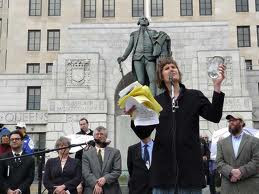And sometimes that poisoning results in cancer from contact with weed killers, pesticides and whatever-the-hell the chemicals are in that toxic cocktail used in hydro-fracking for natural gas.
But any people on the edge about this heard a very compelling case that most people are looking in the wrong direction.
Wrong direction?
Most efforts when it comes to cancer are aimed at curing people who already are symptomatic. But Living Downstream says we need to look at how people are contracting cancers and try to stop things at that juncture, particularly when it comes to environmentally caused cancers.
The 55-minute film lays out the case using Dr. Steingraber's story of cancer as a template. And it contains some great punchlines.
My favorite comes from Steingraber's mother, who at one point says, "Don't let them bury you until you are dead."
 |
| Sandra Steingraber |
In her case, when bladder cancer was diagnosed, she pointed out to her doctors that she was adopted.
Whoops. Nurse! Pass me a new theory, please.
But the townspeople where she grew up in Illinois have an astoundingly high rate of cancer. Coincidence? Hmm.. Perhaps it might have something to do with the factories spewing chemicals into the air and the vast stretches of farmland where a toxic stew of unpronounceable things are sprayed on crops, find their way into the water table and/or are served right with family meals. Or, I suppose, at a supermarket right where you shop.
(I'll be rolling up my car windows when I see anyone spraying fields, or one of those damn crop dusters comes swooping over. Oh, and probably hitting the organic food section more now, too.)
Steingraber is shown in the movie speaking to several groups - as she did last night following the film. And in most of the speeches, she says what we need to do is launch and environmental human rights movement.
With high-quality films like this one - and her two books, Living Downstream and Raising Elijah - it's a movement that is already well underway.
















